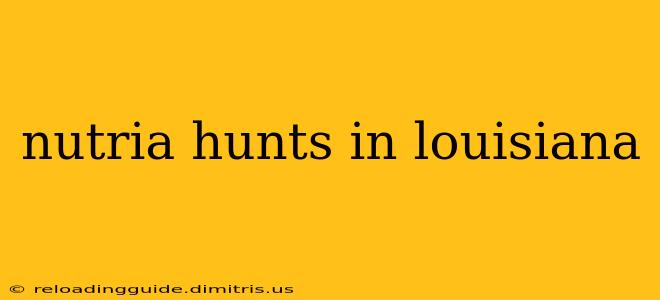Louisiana's battle against the invasive nutria ( Myocastor coypus) is a long and ongoing struggle. These large, semi-aquatic rodents wreak havoc on the state's wetlands, causing significant ecological and economic damage. Nutria hunts, therefore, play a crucial role in managing their populations and mitigating their destructive impact. This guide delves into the intricacies of nutria hunting in Louisiana, covering regulations, techniques, and the broader context of this important conservation effort.
Understanding the Nutria Problem in Louisiana
Before diving into the hunting aspects, it's essential to grasp the severity of the nutria infestation. These animals, originally introduced for fur farming, escaped and rapidly proliferated, devastating the delicate marshland ecosystems. Their voracious appetites for aquatic vegetation lead to significant erosion, habitat loss, and disruptions to the food web. This damage affects not only wildlife but also crucial coastal protection, impacting Louisiana's economy and infrastructure.
The Ecological Impact of Nutria
- Habitat Destruction: Nutria consume vast quantities of vegetation, leading to the loss of vital habitats for native species.
- Erosion: Their feeding habits destabilize marsh banks, accelerating erosion and contributing to land loss.
- Disruption of Food Webs: Their overconsumption of plants impacts the availability of food for other animals, upsetting the delicate balance of the ecosystem.
Louisiana's Nutria Hunting Regulations and Seasons
Louisiana's Department of Wildlife and Fisheries (LDWF) actively promotes nutria hunting as a key tool for population control. The state implements specific regulations to ensure sustainable hunting practices and effective management. These regulations typically include:
- Hunting Seasons: Specific open seasons are established to coincide with optimal hunting conditions and to minimize disruption to other wildlife. These seasons vary depending on the location and hunting method.
- Licensing and Permits: Hunters require the appropriate licenses and permits to legally harvest nutria. Specific permits may be required depending on the hunting method used.
- Bag Limits: Limits on the number of nutria that can be harvested are implemented to prevent overhunting and ensure sustainable populations.
- Legal Hunting Methods: Only specified hunting methods are permitted, often including trapping and shooting. The use of certain equipment may be restricted.
It's crucial to consult the LDWF website for the most up-to-date and precise information on regulations and licensing requirements before engaging in nutria hunting. Regulations can change, and staying informed is vital for compliance.
Effective Nutria Hunting Techniques
Several techniques are employed for hunting nutria in Louisiana, each with its own advantages and disadvantages.
Trapping
Trapping is a widely used and effective method, particularly for sustained control efforts. Various types of traps are used, requiring specific knowledge of trapping techniques and regulations.
Shooting
Shooting is another common method, often used in conjunction with trapping. It requires skill, appropriate weaponry, and adherence to safety regulations.
Regardless of the chosen method, hunters should prioritize safety and ethical hunting practices. This includes proper handling of firearms, safe trapping practices, and responsible disposal of carcasses.
Beyond the Hunt: The Broader Picture
Nutria hunting is more than just sport; it's a vital component of a larger conservation strategy. The LDWF works on multiple fronts to combat the nutria problem, including:
- Research and Monitoring: Ongoing research helps track nutria populations and evaluate the effectiveness of management strategies.
- Public Awareness Campaigns: Educating the public about the nutria problem and the importance of hunting in control efforts is vital.
- Collaboration and Partnerships: The LDWF collaborates with various stakeholders, including landowners, hunters, and researchers, to implement effective management plans.
The success of Louisiana's nutria control efforts depends on the combined efforts of hunters, researchers, and policymakers. Participating in legal and responsible nutria hunts contributes directly to the preservation of Louisiana's unique and vulnerable wetlands. Always check the LDWF website for the most current information.

